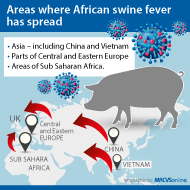
Airport posters urge tourists not to bring pork products home
Defra is launching a campaign at the UK’s border today (31 July) to help keep African swine fever (ASF) out of the country.
ASF has spread widely across Asia, including China and Vietnam, as well as parts of central and Eastern Europe. Cases have also been reported throughout sub-Saharan Africa.
Global pork prices have risen as a result of the outbreaks, which have led to the deaths of more than 800,000 pigs and wild boar in Europe, and around four million pigs in Asia.
Experts warn that if the disease enters the UK, it could have a devastating impact on the country’s commercial pig stock, which numbers five million pigs, as well as the trade in pork products. The government has estimated that in a ‘reasonable worst case scenario’, an ASF outbreak in the UK could cost £90 million, though the National Pig Association (NPA) has said the true figure could be much higher.
Tourists and travellers bringing in contaminated pork products from infected areas are one of the main risk factors for ASF entering the UK. The new poster campaign aims to safeguard the UK’s pig and pork industries, by raising awareness of the disease and the risk of bringing contaminated products in the country.
Other risk factors include illegally feeding swill to pigs, travellers from ASF-affected areas coming into contact with pig premises, contaminated vehicles and equipment being taken to commercial pig premises or workers wearing contaminated boots or clothing.
Minister for biosecurity, Lord Gardiner, said: “While there has never been an outbreak of African swine fever in the UK, we are not complacent and already have robust measures in place to protect against animal disease outbreaks.
“This poster campaign at UK airports and ports adds to the strict control measures we have put in place to ensure that no live pigs, wild boar or pork products from affected areas reach the UK.”
UK chief vet Christine Middlemiss said keeping ASF out of the country is one of her top priorities.
“The virus survives incredibly well in pork meat and can survive for months in smoked, dried and cured meats and likely years in frozen meat,” she explained.
“That is why it is crucial that anyone travelling from affected regions takes this advice seriously in order to ensure that there is no spread of the disease to animals in the UK.”
NPA chief executive Zoe Davies said she was “delighted” by the launch of the campaign, describing it as an “important step” in protecting the country.



 BSAVA is to partner with BVA Live (11-12 June 2026) to champion clinical research.
BSAVA is to partner with BVA Live (11-12 June 2026) to champion clinical research.